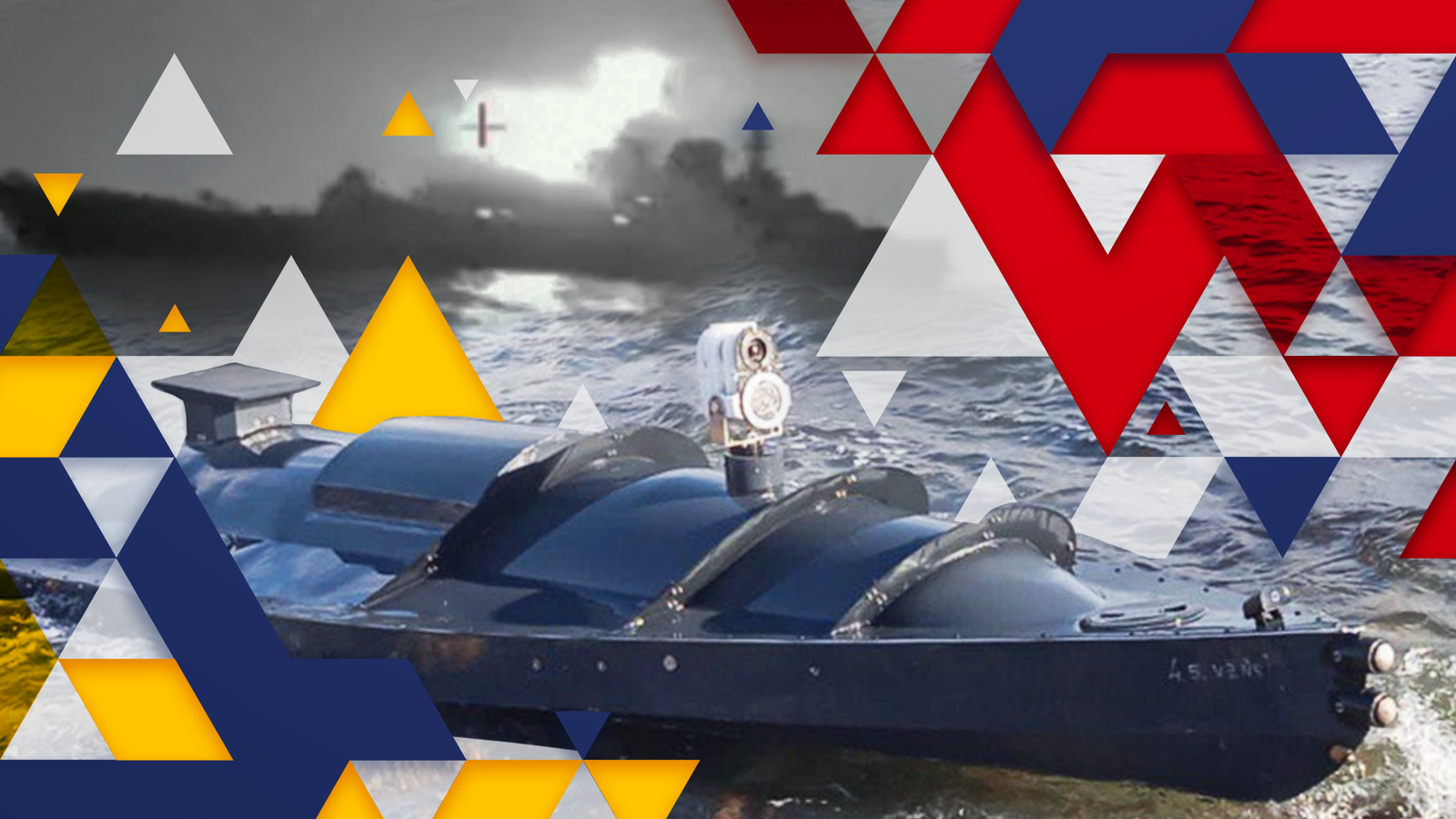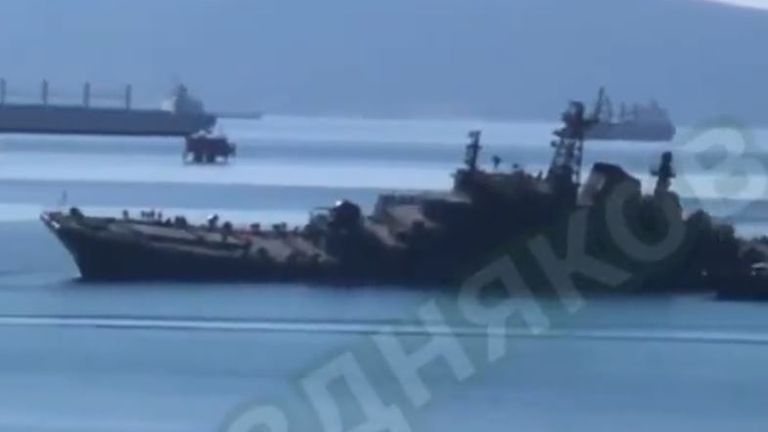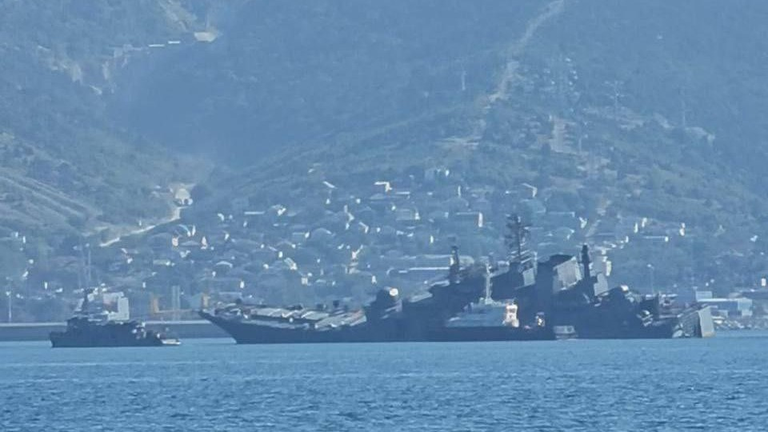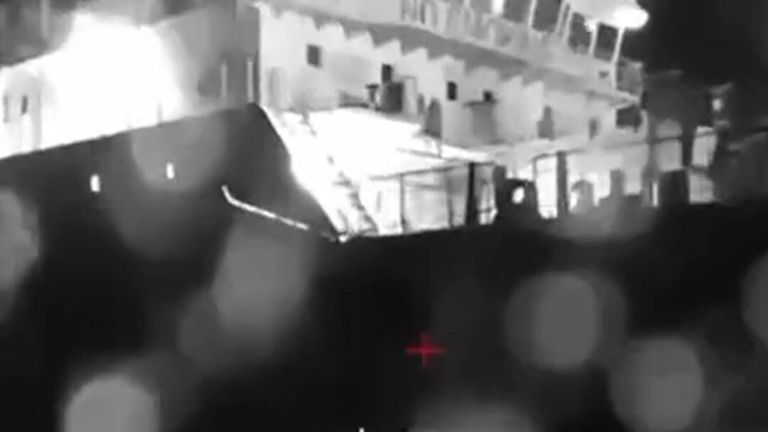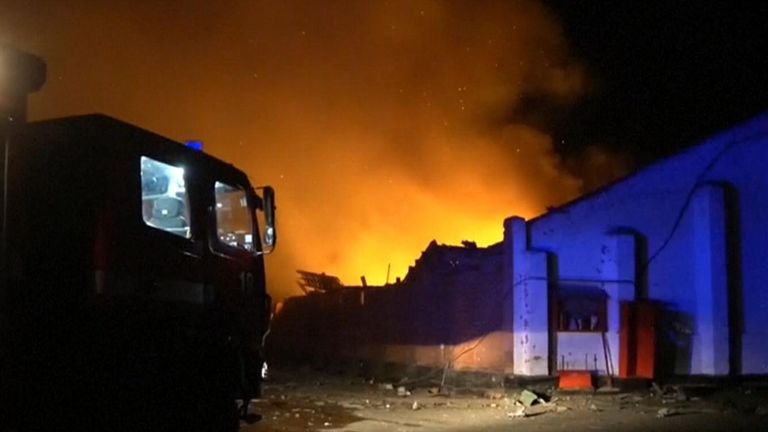Another Russian warship listing in the water is probably not the image Vladimir Putin had in mind for his beloved Black Sea fleet – but it does demonstrate the increasing effectiveness of Ukraine’s sea drones.
The last few days have seen two attacks on Russian ships, both reportedly carried out by Ukrainian unmanned vessels.
In a war where Kyiv does not have the warships to challenge Moscow’s control of the Black Sea directly, the proliferation of sea drones appears to be giving Ukraine an avenue to strike back.
While the strategic value of such attacks is uncertain it is arguably significant for propaganda purposes and as a message to Mr Putin, in the same way as the sinking of the Moskva flagship last year.
Six dead in overnight strikes – Ukraine war latest updates
What happened in the Black Sea?
While questions remain about what exactly has occurred this weekend – and who was responsible – it seems that two Russian ships have been targeted with drones.
The first attack, news of which emerged on Friday, reportedly left the Olenegorsky Gornyak landing ship with serious damage and footage appeared to show it partially submerged as it was towed to port.
A Ukrainian intelligence source said the ship “received a serious breach and currently cannot conduct its combat missions”.
Russia denied the claim, with a regional official saying that no damage or casualties have been reported as a result of the attack.
On Saturday, Moscow claimed that a Russian-flagged tanker was hit by a Ukrainian sea drone close to the Kerch Bridge that connects occupied Crimea to the Russian mainland.
The vessel targeted in Saturday’s attack was delivering oil to Russian troops based in Syria, according to Vladimir Rogov, a Russian-appointed official in Ukraine’s southeastern region of Zaporizhzhia.
The SIG ship, its operator, and its owner, had previously been sanctioned by the US for helping provide jet fuel in Syria.
What are sea drones?
Sea drones, sometimes called USVs, are small, unmanned vessels that operate on or below the water’s surface.
Military analyst Sean Bell told Sky News that these are “relatively cheap” and “provide a relatively fast and low-profile threat to Russian military ships, particularly when the attack is conducted at night”.
He added: “Maritime drones can operate on the sea surface or just below, where it is a lot more difficult for conventional radar to detect.
“They are usually made from carbon fibre to provide an element of stealth capability, and if attacks are conducted at night they are very had to detect with the human eye. And, the sound can be masked by the sea.”
Mr Bell described Ukraine as a “David to Russia’s Goliath” and said it has had to resort to asymmetric attacks to avoid a brutal war of attrition which would favour Russia.
“This has led to the widespread use of drones, whether for tactical surveillance of the battlefield, or for long-range strikes against strategic targets.”
Read more:
Kim Jong Un tells arms factories to increase production
Blood transfusion centre hit by Russian bomb, Zelenskyy says
What impact can they have on the war?
Drones tend to be relatively small and therefore have limited capacity to carry a large explosive charge, Mr Bell says.
“The damage caused tends to be more psychological than physical, albeit the damage to the Black Sea fleet ships might take some time to repair.
“In some respects, drones are like wasps disrupting a summer BBQ – they are unlikely to cause any lasting damage, but they can be a major distraction to the main effort.”
But he added that wars can also be won by destroying the enemy’s will to fight rather than purely through victory on the battlefield.
“Volodymyr Zelenskyy has stated he wants to take the war to Russia, to expose the Russian people to the truth behind the rhetoric, and undermine Putin’s power base with the Russian oligarchs.
“Attacks on Russian territory and on high-profile targets – such as the Black Sea Fleet – all increase pressure on the Russian president.”
What does this mean for the future of warfare?
War generally brings a drive to innovate new and more efficient weaponry, and the conflict in Ukraine over the past year-and-a-half has been no different.
“Although it is always difficult to directly link lessons learned from this war into future conflicts,” Mr Bell says, “most military analysts believe that huge expansion in the exploitation of drone technology will have profound implications for future defence planning.”
He gave the example of the UK’s flagship Queen Elizabeth-Class aircraft carriers, which cost around £1bn each.
“Although there is a comprehensive array of defensive capability around such ships, the ease with which the Ukrainians were able to damage Russian ships will inevitably embolden potential enemies.
“And, the pace at which such technology can be adapted and married to potentially huge quantities of drones, will create an enduring challenge for defence planners.”
